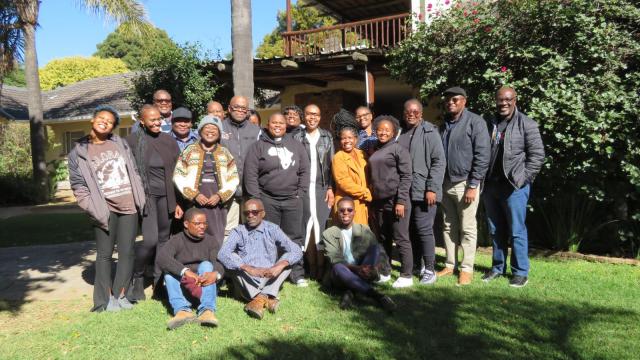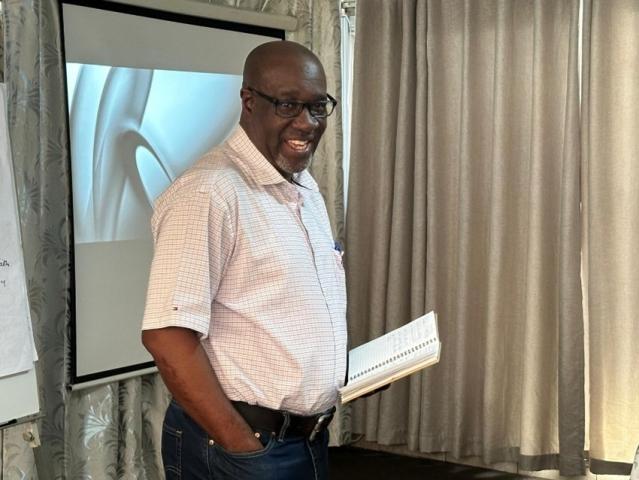Rev. Dr. Japhet Ndhlovu on the inspiring, challenging experience of the Faith Beyond Borders LGBTQIA+ consultation in Johannesburg.

As the cold front swept through Johannesburg, the chill in the air couldn't dampen the warmth of the participants' spirits. We gathered for the Faith Beyond Borders consultation, a diverse group of individuals united by our quest for human dignity and justice. Familiar faces from Maputo 2024 reunited with new comrades from across the region, all sharing a common purpose: to navigate the complex intersections of faith, human sexuality, and gender diversity.
As we hugged and greeted one another, the excitement was palpable. In this space, we would engage in courageous conversations, challenging our perspectives and deepening our understanding of what it means to stand for justice and compassion. This blog captures the essence of our discussions, the struggles we faced, and the triumphs we achieved as we explored the theme of Faith Beyond Borders. My destination was Johannesburg, but the lessons I gathered along the way will stay with me far longer than any stamp in my passport.
The First Stop: Faith as a Place of Refuge and Responsibility
In Maputo, I met Phindile and Wanda, two women whose stories echoed a common refrain: “Church is the very first place we go to. It is a sacred place, a safe place.” Their words reminded me that, for many survivors of gender-based violence (GBV), faith communities are not just spiritual homes—they are sanctuaries in times of crisis.
But I also learned that this sanctuary can sometimes become a site of silence, stigma or even harm. Some religious leaders have abused their power, while others remain silent in the face of injustice. Yet, there are also those who speak out, act decisively, and place survivors at the center of their work. The challenge, I realized, is for faith communities to recognize both their power and their complicity, and to choose the path of transformation.
As the program unfolded, I discovered the Faith Action to End GBV Collective—a movement born out of the urgent need to address the epidemic of gender-based violence in South Africa. This collective was established not just in response to crisis, but as a vision for an inclusive and harmonious society, free from violence and femicide. Their work is rooted in collaboration, drawing together diverse faith groups, survivor networks, and advocacy organizations. I saw how joint advocacy and media campaigns can shift deeply rooted patriarchal norms, and how faith leaders can be equipped to offer real support to survivors through innovative training programs.

Drawing from Our Own Wells: African Wisdom for Inclusion
In Johannesburg, I encountered the idea of “drawing from our own wells.” This concept encouraged me to look within African traditions, cultures, and faith for resources to build inclusion, diversity, and justice, especially as related to non-binary sexual minorities. I learned about the three-legged pot—a powerful symbol representing the balance needed between Constitutions (human rights), Culture, and Christianity (religion). When these three spheres cooperate, communities stand strong and inclusive. When they are in conflict, exclusion and violence follow, especially for women and LGBTQIA+ people.
I heard stories of exclusion, particularly from LGBTQIA+ individuals, who often find themselves marginalized not only by society but by the very communities and churches that should offer support. The challenge, I realized, is to transform these spaces into true sanctuaries for all.
One of the most profound lessons came from the Akan concept of Sankofa—a mythical bird that flies forward while looking back, retrieving wisdom from the past to guide the future. I learned about the Kairos Document, the Belhar Confession, and the Elmina Statement—African theological resources that call for justice, inclusion, and decisive action in the face of oppression. The Kairos methodology—See, Judge, Act—became a guiding principle: understand the context, discern through the lens of justice, and take concrete steps for change.
A Commitment to Action
By the time I reached the conclusion before we could say our goodbyes, I understood that the journey was not just mine. It belongs to all who are willing to speak out, collaborate, share knowledge, and disrupt harmful norms. The commitment I witnessed in faith communities—standing up, acting decisively, and being accountable to survivors—became my own.
The consultation participants resolved the following: “Sexual and gender-based violence is unacceptable, inexcusable, and intolerable in all its manifestations. Yet, we confess that we have sometimes chosen not to see, or tolerated sexual and gender-based violence. We have been collaborators and co-conspirators against the very essence of our creation. Therefore, we commit to standing up, speaking out and taking decisive action, and to being accountable to survivors, to each other, and to God.”
My journey from Maputo to Johannesburg taught me that true change is possible when we draw from our own wells, honor our past, and act together. The road ahead is long, but with faith, collaboration, and the courage to confront our own complicity, we can build communities where everyone is safe, included, and valued.
Rev. Dr. Japhet Ndhlovu is Executive Minister, Church in Mission, with The United Church of Canada.
The views contained within these blogs are personal and do not necessarily reflect those of The United Church of Canada.